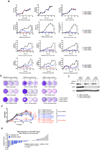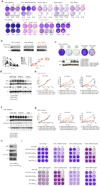SWI/SNF-mutant cancers depend on catalytic and non-catalytic activity of EZH2
- PMID: 26552009
- PMCID: PMC4886303
- DOI: 10.1038/nm.3968
SWI/SNF-mutant cancers depend on catalytic and non-catalytic activity of EZH2
Abstract
Human cancer genome sequencing has recently revealed that genes that encode subunits of SWI/SNF chromatin remodeling complexes are frequently mutated across a wide variety of cancers, and several subunits of the complex have been shown to have bona fide tumor suppressor activity. However, whether mutations in SWI/SNF subunits result in shared dependencies is unknown. Here we show that EZH2, a catalytic subunit of the polycomb repressive complex 2 (PRC2), is essential in all tested cancer cell lines and xenografts harboring mutations of the SWI/SNF subunits ARID1A, PBRM1, and SMARCA4, which are several of the most frequently mutated SWI/SNF subunits in human cancer, but that co-occurrence of a Ras pathway mutation is correlated with abrogation of this dependence. Notably, we demonstrate that SWI/SNF-mutant cancer cells are primarily dependent on a non-catalytic role of EZH2 in the stabilization of the PRC2 complex, and that they are only partially dependent on EZH2 histone methyltransferase activity. These results not only reveal a shared dependency of cancers with genetic alterations in SWI/SNF subunits, but also suggest that EZH2 enzymatic inhibitors now in clinical development may not fully suppress the oncogenic activity of EZH2.
Figures




References
-
- Wilson BG, Roberts CW. SWI/SNF nucleosome remodellers and cancer. Nat Rev Cancer. 2011;11:481–492. - PubMed
References for Methods
-
- Fujimoto A, et al. Whole-genome sequencing of liver cancers identifies etiological influences on mutation patterns and recurrent mutations in chromatin regulators. Nature genetics. 2012;44:760–764. - PubMed
Publication types
MeSH terms
Substances
Grants and funding
LinkOut - more resources
Full Text Sources
Other Literature Sources
Molecular Biology Databases
Miscellaneous

